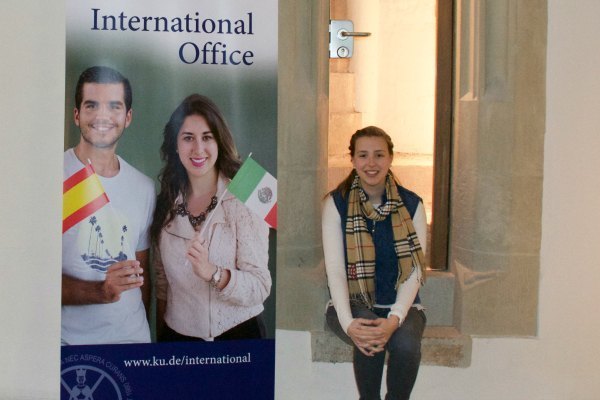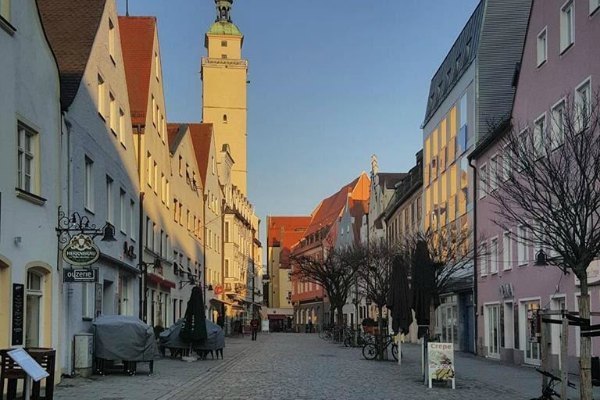
Living a life on the margins of society is an unfortunate reality for many forcibly displaced persons. Bridget Rickard ('18), a double-major in Philosophy and Peace Studies, received a Break Travel and Research Grant for Sophomores and Juniors to travel to Germany to explore the following question: What are German scholars, as well as local and national humanitarian actors doing to accompany those on the peripheries of society in their journey toward socio-economic integration? Bridget recently wrote to us about her experience:
Refugees, like others among the forcibly displaced, live on the margins of society. Stripped of both their individual and communal identities, they are forced to exist outside of time and place, told instead to live in what many are fortunate to consider a fantastical nightmare – a reality characterized by instances of injustice, humiliation and systematic socio-economic exclusion. This lived reality, according to many social scientists and intelligence agencies, is what makes refugees more susceptible to radicalization than any other population. It is, therefore, of the utmost anthropological and political urgency that scholars and practitioners work to ensure that refugees are treated justly and with dignity, as well as accompanied by the structures necessary for successful socio-economic integration.
Scholars unanimously agree that chief among the structures necessary for successful socio-economic integration is a comprehensive educational system. Existing research proves that K-12 education can successfully facilitate the socio-economic integration of vulnerable adolescents. However, little research exists on how education can successfully facilitate the socio-economic integration of vulnerable adults. Thus, eager to contribute to this scholarly “desert,” I set out to answer the following question: Can the education of adult refugees successfully facilitate their socio-economic integration?

To answer this question, I travelled to Eichstätt, Germany with two other Notre Dame students to conduct a pilot study on the extent to which the German language and job skill acquisition courses offered by civil society actors, such as Tun.starthilfe – a non-for-profit run by university students – and community partners, such as Katholische Universität Eichstätt-Ingolstadt, help adult refugees become integrated into Germany’s society and economy. My research methodology was primarily ethnographic, consisting of both classroom observations and interviews with various individuals: leaders of local and national NGOs, Bavarian civil servants and several Katholische Universität professors and administrators. In addition, I visited several refugee camps and intake centers in Eichstätt, Noiberg, and München, as well as interviewed several of the residents within these camps/centers. My experience was very fruitful, as my findings not only provided the ethnographic underpinnings for my current research but also laid the foundation for my future capstone projects in Peace Studies and Catholic Social Teaching. Given the scope of this essay, though, I have chosen to only share one of the most insightful findings of my research.
In my first interview of the trip, I had the pleasure of speaking with Dr. Joost Van Loon, a sociology professor at Katholische Universität. My interview with Dr. Van Loon proved indispensable to my research endeavor, for it was through our conversation that I learned that forestalling any conclusion about socio-economic integration was the necessary understanding that any integration effort must presuppose a sociology; that is, in order to answer my research question I had to first understand that work is the primary metric by which German citizens measure their own and others’ value as both a member of the human family and as a German citizen. This insight was further articulated by both Aton Knapp, Eichstätt County’s chief commissioner, and Jürgen Croce, the director of Eichstätt County’s government-funded job center. In my interviews with the head of the Bavarian Refugee Council, a social worker for Caritas Germany, the founders of Tun.starthilfe and a job skills instructor at the local Berufsschule (vocational school), I learned that most employers only hire refugees whose German language skills are at the level of limited working proficiency. It can be said, therefore, that learning German is necessary for one’s successful integration in Germany’s society and economy. And thus, the work of Tun.starthilfe and other like non-for-profits who offer German language classes and job skills training is indispensable to the efforts of integrating adult refugees into Germany’s society and economy.
I extend my deepest gratitude to the Nanovic Institute for European Studies for funding this research, for both my experience and findings led to the realization that I wish to give my life in service to some of the most marginalized members of the human family – internally displaced persons, migrants, and refugees. Furthermore, it is my hope that my experience and findings will provide the foundation for my future contributions to the exploration and framing of questions of forced displacement and economic migration.